#the pipeline from the analysis being about ‘fyodor Really likes daydreaming huh’ to ���Atsushi is Jesus’ is really something
Explore tagged Tumblr posts
Text
An Overanalysis of That Bsd 119 Panel
“If God does not exist, everything is permissible.”
—Fyodor Dostoyevsky, The Brothers Karamazov

With one of the most intense displays of genuine emotion that we’ve seen from Fyodor paired with the Expression emphatically taking up over half the page, I immediately wondered, what does this tell me about Fyodor?
I’ve seen a lot of interesting analysis floating around already, with the main two being: Fyodor doesn’t think Atsushi represents the “noble” beast of his ability, and/or Atsushi’s attitude reminds Fyodor of his past self.
However, to me, it seems that Fyodor’s reaction is a natural culmination of his obsessive and hypocritical search for perfection.
Part I: Fyodor’s Impossible Idealism
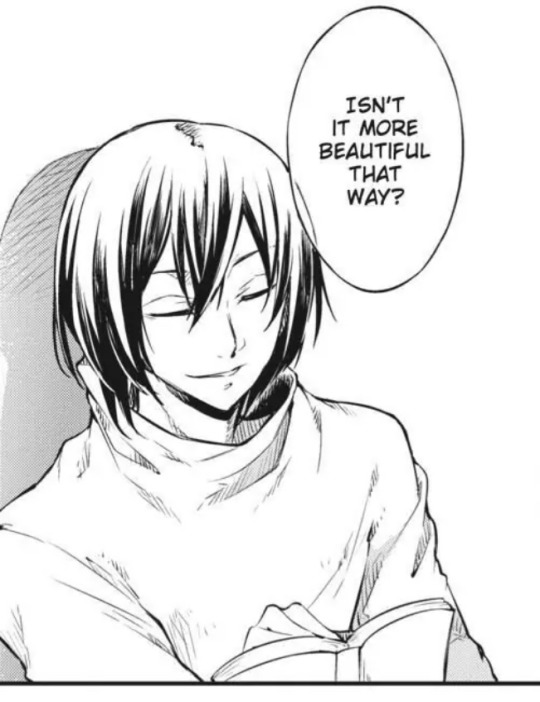
Fyodor has always been a romantic.
Not a romantic as in someone interested in ‘romance,’ but a romantic as defined by Oxford Languages: “[someone or something] characterized by…an idealized view of reality.”
From the beginning, Fyodor’s goals has always been steeped in idealism. “Saving” the world! Though thankfully a departure from the omnicidal maniac trope (I hate it! If you destroy the world, what then, genius), saving the world is as nearly nebulous as destroying the world. What does saving the world mean?
To Fyodor, it has been stated that he means cleansing the world of sin: ability users.
But I would argue that a better way to phrase this would be to cleansing the world of imperfection. Fyodor doesn’t only view ability users as imperfect, he views humanity as a whole as imperfect. I hinge this arguement where upon Dazai meeting Fyodor for the first time and talking with him in prison, Dazai says “people are sinfully stupid,” not ability-users, in opposition to Fyodor’s ideologies.

The second reasoning for this arguement is that while Fyodor hates ability users, he has no problem killing non ability users. You would think for someone who puts so much emphasis on abilities users as “sinful” that he would subsequently view non ability users as pure, right? Yeah, no.

“But Fyodor,” someone asks. “After you erase all the ability users how the fuck are you going to fix the rest of humanity?”
For one, he’d be dead (someone correct me on this if he said he’d kill all ability users but himself). For two, if the former () is the case, then is he just going to… write all of the rest of humans as perfect? Is he going to kill them to a write a version of humanity that is perfect? If that’s the case, then what the hell does ‘perfect’ mean to fyodor?
Another popular theory is that Fyodor is attempting to rewrite the world from the beginning without abilities, but that brings up the same issue in my second point—Fyodor doesn’t exclusively view ability users as imperfect, he views all of humanity as imperfect.
His plan is full of holes when you consider how exactly he defines “perfect.”
Therefore, I’d like to go forward in this analysis with the assumption that Fyodor is attempting to kill all ability users, including himself, through the “salvation” of death to create a “perfect” world despite all logistical fallacies.
So… what was the purpose of this tangent? It’s that I believe Fyodor’s search for perfection is futile, he likely knows it, and his goal is simply the largest unwilling suicide pact the world has ever seen.
Part II: Does Fyodor even believe in God?
Before this section begins, I’d like to define religiousness by the unconditional belief in gods or a god.

Short answer: yes. Slightly longer answer: well, yes, but…
Fyodor embodies of the churchgoing villain trope to a tee—at every possible moment he uses religion as a directive to all his actions. God, to Fyodor, is his patron.
What makes Fyodor’s religious zealousness so interesting to me is that highly intelligent, calculating, and cunning villains are often associated with ideologies ranging from relaxed-religiousness to atheism in media. Dazai is an example of this—he a deist who believes that god exists—but has created a world which runs on inconsistencies and absurdity.

Hell, Raskolnikov, the main character from from Crime and Punishment himself is an example of an intelligent character who is non-religious. While Raskolnikov is not a villain or a necessarily an irredeemable person, he is, as opposed to BSD Fyodor (the character of whom he inspired), an intelligent “bad person” who is notably non-religious. The following is a quote from Raskolnikov, in Dostoevsky’s Crime and Punishment, where he cynically comments about a religious character.
“At first he was afraid that she would worry him about religion, would talk about the gospel and pester him with books.”
Which naturally leads to the next question: why is Fyodor so religious if it clashes against both his literary counterpart and the tropes associated with an “intelligent villain”?
Trick question: I don’t think Fyodor is religious at all.
I believe that Fyodor’s fervent belief in god does not come out of genuine faith, but rather a desperate need to justify his own crimes. After all,
“If God doesn’t exist, everything is permissible.”
That is an adapted quote referenced in BSD 42 from a conversation in another one of Dostoevsky’s books, The Brothers Karamazov. The meaning of the quote is that the presence of god gives moral guidance meaning, and without god, humanity falls into anarchy.
After all, if heaven and hell do not exist, if god does not exist, or if god exists but he doesn’t care, or if god exists but he hates Fyodor, then… there’s no such thing as Fyodor’s idea of perfection. All of his plannning and scheming will be for naught. The slaughter and manipulation he has enacted across centuries will be pointless.
Fyodor must believe in his idealism (his version of god) or else his world views, his idealism, his raison d'etre—crumbles.
So let me ask the question again. Why is a villain who is as intelligent as Fyodor also religious? It’s because he must be, or he’d go insane.
“God is necessary, and therefore must exist... But I know that he does not and cannot exist... Don't you understand that a man with these two thoughts cannot go on living?”
This is a quote from Dostoevsky’s Demons, which perfectly describes what I believe about Fyodor’s motivations. I believe that deep within Fyodor’s fucked up mind, he understands that either god does not exist or that god exists, but hates/doesn’t give a rat’s ass about Fyodor.
However, Fyodor’s idealism has no room for nuance, even though someone of his intelligence must already understand that. Anything that challenges his idea of god, his idea of salvation, his idea of perfection, will challenge his very reason for being alive.
Which is what brings us to:
Part III: My Bad; The Panels this Analysis was Supposed to be About
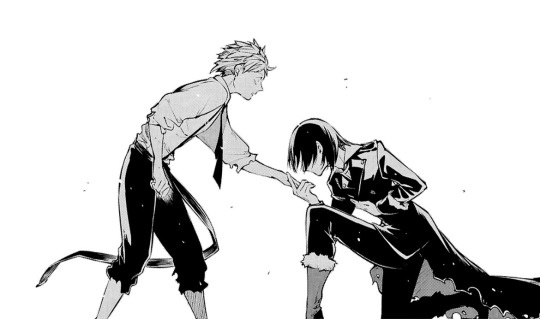
In the past few years, there has been a recent shift in the fandom’s general perception Fyodor. He is no longer perceived as a character with a god complex, but rather character with a messiah complex(also known informally known as a Jesus complex). This is basically cemented in Fyodor’s last words before ‘death’: “Eli Eli lama sabachthani,” which mirrors Jesus’s words, not god’s.
While both god complexes and messiah complexes arise from the same core insecurities and delusions of superiority, those with messiah complexes are often characterized by their extreme empathy and intense desire to “save” others.
Looking at Fyodor, you wouldn’t think that he is a highly empathetic individual, but it is only because of his advanced emotional intelligence that he understands the human condition intimately enough to manipulate it—and he uses that power to try to “save” humanity the same way he perceives Jesus would.
But… if anything, it’s Atsushi who resembles Jesus.
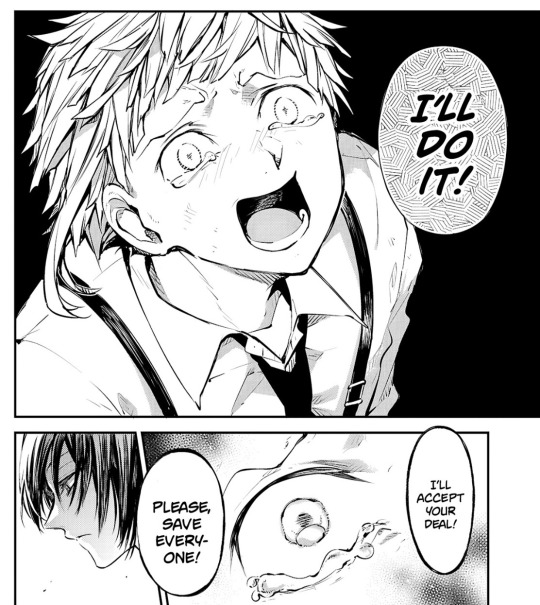
Atsushi is compassionate; he extended his sympathy and respect to both Kyouka and Akutagawa, two people who attempted to kill him. Atsushi is selfless; from episode 1, he attempted to use his own body to cover a bomb in order to protect the ADA (people who he had barely known at the time!). Atsushi is humble; he denies his power and affability when confronting Lucy’s anguish.
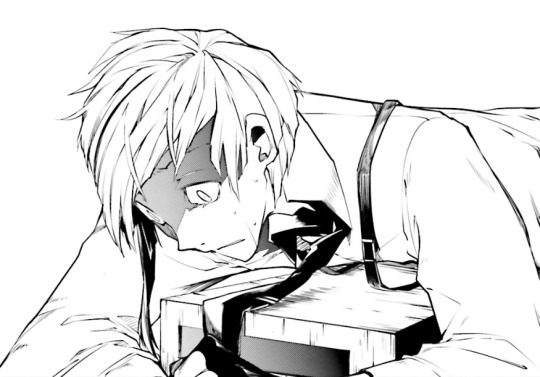
(Arguably, you could say that Atsushi’s selflessness in the beginning was more motivated from self-hatred then true altruism—and you would be right, but once Atsushi learns a sense of confidence, his selflessness does not disappear… it just becomes genuine.)
Compassion, selflessness, and humbleness—all values that Jesus is said to preach.
The prideful Fyodor knelt before Atsushi in hopes a finding a god to his “Jesus,” but all he found was a painfully human boy. Not only that, he found a man who is more of a savior than he will ever be.
To add insult to injury in 119, Fyodor discovers Atsushi is an imperfect being who resides within what he had previously believed to be a perfect being. He is a contradiction—a nuance—and like I said before, Fyodor’s idealism has no room for what-ifs and buts. If he entertains a single contradiction(like Atsushi), his entire world view collapses.
So, Fyodor goes on the defense. In his attempt to rid himself of the so-called pathetic humanity he sees Atsushi demonstrating, he demonstrates some pathetic humanity of his own: For the first time we’ve seen since Fyodor has been introduced, Fyodor forgets his fixed benevolent, lofty, half-amused persona and gets pissed off.
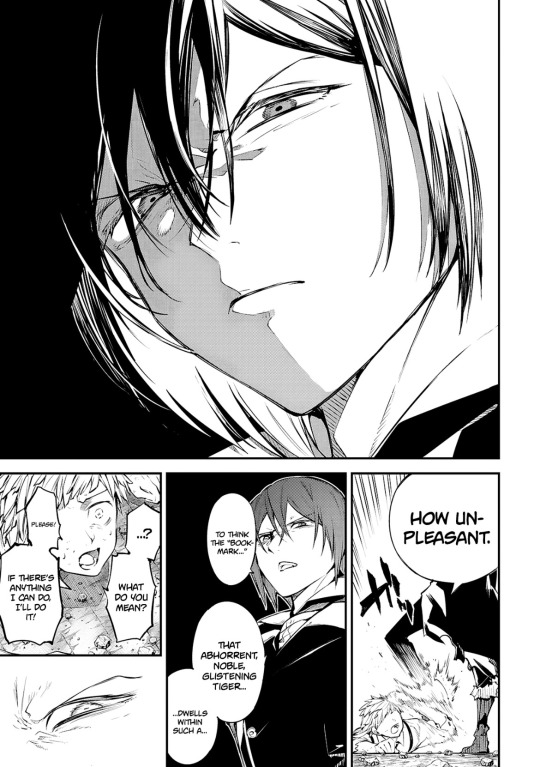
More often than not I believe self-righteous anger comes as a result of insecurity and doubt. I imagine that his inner monologue is going something along the lines of: ‘how could this noble, god-like creature be so stupid, base, human? How could this faux-divine suggest that I am not already saving humanity? How could I have ever believed that he could be the perfect one I’m searching for?’
What I said before, about how Fyodor’s idea of perfection is a zero sum game and he knows it; it is reflected in his interaction with Atsushi. Atsushi’s mere existence and personality is evidence of what Fyodor has been trying to deny this entire time: his ideal of a “perfect world” does not exist.
“Your worst sin is that you have destroyed and betrayed yourself for nothing.” —Fyodor Dostoevsky, Crime and Punishment
#bungou stray dogs#fyodor dostoevsky#atsushi nakajima#meta#character analysis#bsd 119#there were a lot of things I had to cut from this analysis to keep it condensed in one post…#according to a PSPR study conducted in 2013 there does seem to be a slight negative correlation between religiousness and intelligence#I swear im not talking out of my ass!#the pipeline from the analysis being about ‘fyodor Really likes daydreaming huh’ to ‘Atsushi is Jesus’ is really something#btw god complexes and messiah complexes are not diagnosable disorders#they are viewed as symptoms of narcisstic personality disorder#even still looking at the mental illnesses associated with messiah complex match fyodor to a tee and happen to match a Lot of fandom#perception to a scary degree#I will make a separate post about it
31 notes
·
View notes